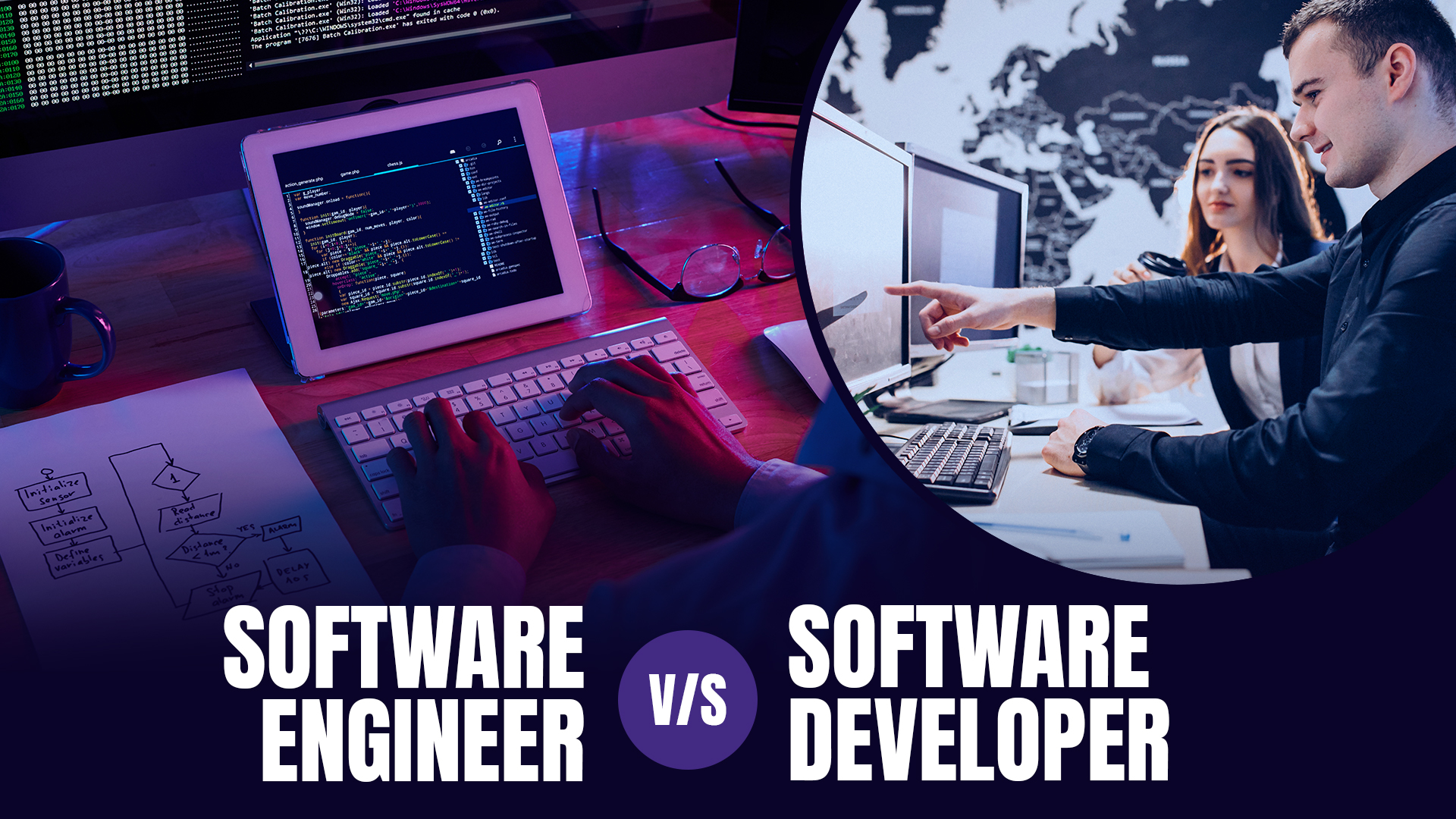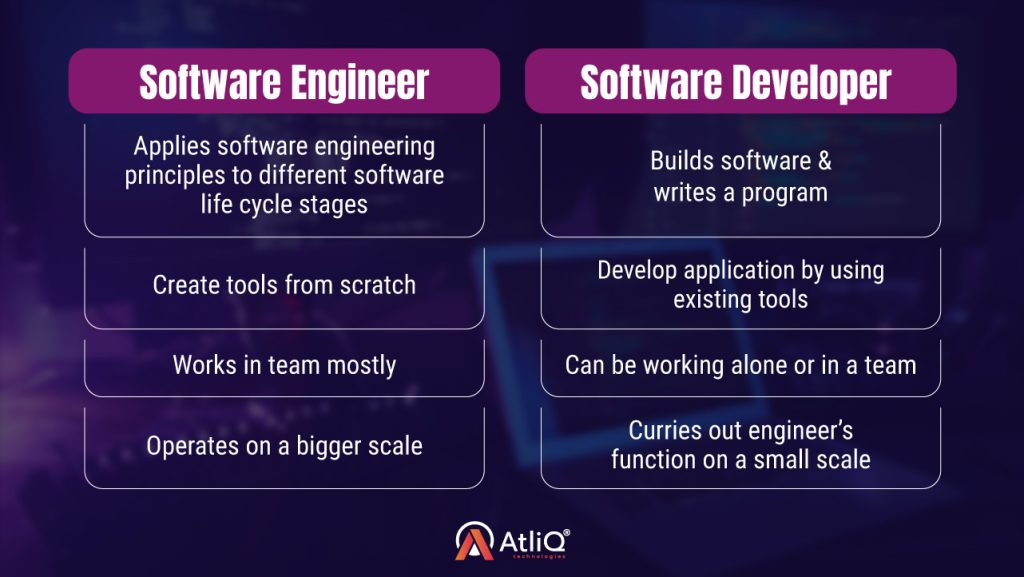Software Engineer V/s Software Developer- Pick What Suits You

While these two job profiles sound similar, their approach to computer science is different. Often even the individuals in computer programming interchange these terms, and even titles and job posts are switched.
Who is a Software Engineer?
A software engineer is one who applies the principles of software engineering for designing, developing, maintaining, testing and evaluating computer software. This is primarily considered a team activity. A software engineer works with hardware system components and creates tools to develop software. They also tend to solve issues on a much larger scale.
Skills for Software Engineer:
Software engineers create computer software and systems, employing maths, logical reasoning, design techniques, and obviously engineering. They usually hold a computer science degree and strong analytical and problem-solving skills. Apart from technical skills, they have to maintain strong communication and interpersonal skills.
Top Technical Skills for a Software Engineer
- Software Development Life Cycle: SDLC knowledge is considered a must for software engineers as it encompasses the process of conceptualizing software maintenance. The SDLC phases are
- Project requirements and analysis
- Feasibility studies
- Project design
- Project implementation and coding
- Testing
- Deployment
- Maintenance and improvement
- Data Structure & Algorithm: These two are considered vital components of the software process. Data structure knowledge allows one to organize data and also is applicable for real-life challenges. It also allows you to keep your code clean and optimize the user experiences.
- Programming Language: Proficiency in one or two major programming languages is considered important. Popular programming languages include HTML, CSS, Ruby, TypeScript, etc. It is important to make sure you have an in-depth knowledge of the programming language the employer uses.
- Operating Systems: Several operating systems include Windows, Mac & Linux, which is important for the software engineer to have the basics of these OS.
- Database: It is important to have a good understanding of aspects of software and application development for software engineers. SQL is the industry standard for database management. Common database administration functions including how to create, update, store, modify and insert records.
- Encryption & Cryptography: Encryption ensures that only one person with a specific key can get access to a system/ network. Cryptography is used to secure databases & protect data transmission over a network.
Duties & Responsibilities of a Software Engineer:
- Develop new software in alignment with the core requirements and values, & lending own creativity.
- Develop fault-free programs
- Create a scalable multi-platform version of the software package
- Develop automated solutions
- Ensure compatibility and stability through constant code tests
Who is a Software Developer?
The creative brainstorming masterminds behind all sorts of computer programs are the software developers. While few focus on specific programs or applications, others focus on giant underlying systems that trigger other programs. Software engineers are widely classified as Application Software & System Software Developers.
Skills for Software Developers:
Software developers are now asking about how to become a highly valued professional & how to become a highly valued professional. Brushing up below mentioned skills can help them to up-level their career as software developers.
Top Technical Skills for a Software Developer:
- Object-Oriented Programming: Knowledge of programming languages like C++, Java, JavaScript, or Python is always advisable. This knowledge is immensely powerful and allows you to do virtually anything.
- Git & GitHub: Git & GitHub have streamlined the market and more than 70% of organizations use Git. Source control is used to store code, and thus version control tools like Git and SVN.
- Cloud Computing: Learning Cloud platforms like Amazon Web Service, Google Cloud Platform, or Microsoft Azure are something that is a must for cloud computing. They are essential for all development in the fields of data science, machine learning, and artificial intelligence. It is because only the cloud can provide the computing power needed by the resource-hungry models.
- Containers (Dockers & Kubernetes): Containers help in testing the application in a unified environment and also make the deployment process easier. Dockers & Kubernetes are two containers that will help in getting the edge for any software developer. These are becoming the most sought-after skills that companies are looking for in the coming years.
Duties & Responsibilities of a Software Developer:
- Design algorithms & flowcharts with developers
- Develop & verify programs and systems
- Upgrade, debug/ troubleshoot existing software
- Collect & evaluate the users’ feedbacks
- Conduct integration of software components & third party programs
- Recommend & execute improvements
- Maintain technical documentation for further reference/ reporting
Which Profile to Pick?
While the profiles are confused internally even today, there are few shared traits. The most similar traits of a successful software developer and an engineer are- curiosity, creativity, and logical thinking. The most important common characteristic shared by these two profiles is being a detail-oriented problem solver who excels in mathematics. While the skillset overlaps, a software engineer holds a larger scope of responsibility and thus requires a wider skill set.
While a software engineer possesses the same skill set, a developer might not always have the same technical knowledge. Thus, typically a software developer enjoys an opportunity to develop and expand their skill set to advance their career to a software engineer.

Concluding Words
A software engineer is more likely to dabble in software development, while a software developer does not commonly work on engineering tasks.
Unfortunately, there is no official distinction between the roles, as the majority of the companies are using the terms as per their convenience. They alter it in a way it suits their needs, experience, and knowledge. Adding to the confusion, there are regional variations as well with distinct differences in education.




